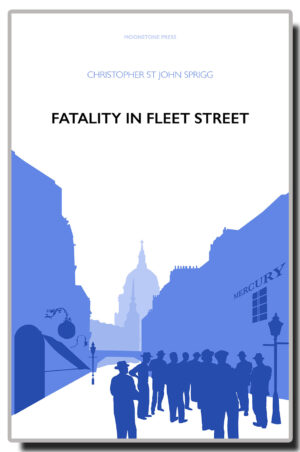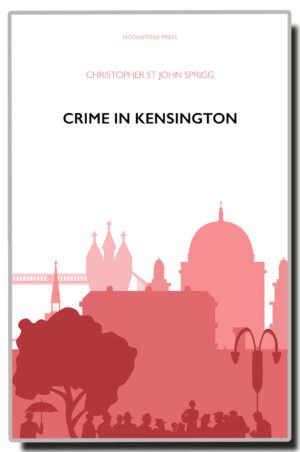Death of a Queen
Give up your foolish plan. If not you die.”
When elderly Queen Hanna of Iconia discovers the anonymous letter in her dress pocket, she knows someone in her household is spying on her. The queen is secretly planning a ceremony of atonement that she hopes will secure the royal succession. Journalist Charles Venables is asked to help identify the spy before her next public appearance. But when Queen Hanna is strangled with a museum relic known as the ‘Curse of the Herzgovins’, Venables knows an all too human hand is involved. But how was the murderer able to enter the queen’s heavily guarded chamber? And why was the body found wearing the royal ceremonial robes rather than the clothes she had retired in?
Many Golden Age books have a plot involving an imaginary European kingdom, inspired by ‘Ruritania’, the setting for the 1894 bestseller The Prisoner of Zenda. Ruritania became the basis for hundreds of imitations (Lutha, Graustark, and Riechentenburg to name but a few) as well as parodies — the Marx Brothers’ film, Duck Soup, features Groucho as the dictator of mythical Freedonia. The Ruritanian setting was so broadly known that the author refutes it directly in Death of a Queen. When Venables complains ‘This place sounds dreadfully like Ruritania’, his colleague replies ‘There’s nothing Ruritanian about Queen Hanna.’
Author Christopher St John Sprigg was a polymath who read widely across history, politics, and culture, and he put this knowledge to good use in Death of a Queen, devising Iconian history, heritage and architecture with an enthusiasm and realism that add to the book’s appeal.
£9.99
By Christopher St John Sprigg
Author of Death of an Airman
Originally published in 1935 by Eldon Press Ltd
Paperback
251pp
ISBN 9781899000050
Interesting links
Martin Edwards’ Crime Writing Blog
2 reviews for Death of a Queen
Only logged in customers who have purchased this product may leave a review.
The Mysterious Mr. Shillingford
When Charles Venables returned from lunch at four o’clock he found a telephone message waiting for him. It was from Superintendent Manciple, who asked Mr. Venables to come round and see him, on an urgent matter, at half-past four that day. He was to ask for Room No. 352/AL, New Scotland Yard.
Two years ago a peremptory message from Manciple, then an inspector, had resulted in the arrest of Charles Venables. But Venables and Manciple had long forgiven each other that little error for which, to tell the truth, Venables was quite as much to blame as the Scotland Yard man.
Venables was puzzled. “Have there been any murders while I’ve been away?” he asked Clavering, the assistant news editor of the Mercury.
Clavering scowled at the Mercury’s privileged crime investigator. “Not that I know of. There might have been a murder if you had taken much longer over your lunch. Heflin has sent a messenger to find you twice already this afternoon.”
“One must eat,” said Venables humbly.
“Why don’t you?” answered Clavering rudely. “The last time I had lunch with you I don’t remember seeing you consume anything solid.”
Venables decided not to answer this, and walked moodily back to his room. By this time it was necessary to take a taxi if he was to arrive at Scotland Yard by half-past four.
He seemed to be expected at the Yard, almost anxiously expected, thought Venables, being used to a far more off-hand reception in these official halls. He was pounced on by a policeman and piloted swiftly to the Superintendent, whom he found busy with three visitors.
Venables greeted Manciple with a cheerful salutation. The detective himself was not a cheerful man; nor yet could he be described as gloomy. The fat creases of his broad face were arranged in folds which gave it an appearance of imperturbable, Mongolian inscrutability. Whatever Manciple’s views on the functions of the human face may have been, he plainly did not include among them the office of expressing the feelings of the possessor. By repeated prodding, Venables had discovered a keen and somewhat malicious sense of humour behind Manciple’s impassive exterior, but the bright jest with which he greeted the Superintendent now fell on unresponsive ground. Manciple ’s formal reply suggested that the matter for discussion was serious. Venables accordingly looked carefully at the visitors. The first, on the right, a pale individual in a black hat, Venables decided was a minor poet. Possibly a Communist. In the centre was a blond giant, who looked like a Scandinavian athlete, in a suit almost certainly produced by an English tailor. On the left was a slim, dark, foreign-looking young man. An Italian, guessed Venables.
The Scandinavian athlete stared at Venables blankly out of his very blue eyes, and then turned to the Italianate young man.
Manciple rose and introduced Venables to the minor poet. “This is Mr. Venables, about whom we have been speaking.
“Mr. Lancelot of the Foreign Office,” explained Superintendent Manciple to Venables.
Venables felt a trifle disconcerted at his wrong diagnosis of the pale individual. But, as it turned out later, he was not altogether wrong. Mr. Lancelot had in fact published verse, and he was suspected by some of his colleagues of Marxist leanings…
Mr. Lancelot now took over the burden of introduction. He drew Venables towards the Scandinavian athlete, holding the journalist firmly by the left arm, as if in fear that he might run away. “Mr. Charles Venables, sir, of the Mercury,” he said to the giant. Then Mr. Lancelot gave Venables a penetrating glance sideways. “Mr. Shillingford,” he whispered in Venables’ ear.
The dark Italian was not introduced. He appeared to be a kind of appendage, secretary or such-like, of the Scandinavian giant. Venables’ guess as to his nationality was, however, partly confirmed when Mr. Shillingford referred to him later as “Luigi.”
At the moment, however, Venables’ attention was concentrated on something odd about Mr. Shillingford’s manner, and indeed about Mr. Shillingford himself. This athlete (surely no one but an athlete could have that huge torso, and that clear skin) spoke perfect English, without a trace of foreign accent. Yet Venables stuck to his first impression that the man was not English. There was something Continental about the cast of the features, the close crop of the hair, the heavily be-ringed fingers, and salmon-pink silk shirt…
Mr. Shillingford, still seated, extended his hand to Charles Venables graciously and gracefully, rather as if he was giving a pet animal a bun. Luigi had risen from his chair, and Mr. Shillingford, lifting it in one giant hand, moved it in front of him. Then he motioned Venables into it, patting him gently on the arm as he seated himself. “Excellent,” the giant murmured encouragingly. Venables felt more than ever like a household pet.
Suddenly something clicked in Venables’ brain. Twice before he had met this manner, this queer blend of haughtiness and almost menial affability. The first time it had been the Hereditary Grand- Duchess of Georgina, and the second the ex-King of Kossovia—his only two encounters with royalty. This particular manner was, of course, the inevitable badge of the tribe of royalty, as clearly marked as the professional manner of the lawyer, the doctor, or the priest. The Scandinavian athlete then was a royalty of some kind. Hence, no doubt, the presence of Mr. Lancelot from the Foreign Office. The question was—what illustrious name did the rather ridiculous incognito of “Mr. Shillingford” cloak? Was he a full-blown sovereign, or a princeling? Hardly the former, thought Venables, or surely they would have heard of his arrival in England at the Mercury. Venables decided to go for the latter.
“Thank you, your Royal Highness,” he murmured as he seated himself in the chair.
Mr. Shillingford and Mr. Lancelot exchanged a glance—Mr. Shillingford’s was inquiring, Mr. Lancelot’s humble and deprecatory. “Very acute…” murmured Mr. Shillingford. Even Manciple nodded approvingly.
“Mr. Shillingford came to us for help,” explained Mr. Lancelot. “He came at the request of his mother.”
Mr. Shillingford nodded solemnly in confirmation. “They—he—want someone possessed of some experience in—er—investigation to look into certain events which have occurred in their—house.” Mr. Lancelot cleared his throat. “For a variety of reasons it is undesirable to employ what I may perhaps call local talent.” Mr. Shillingford here showed his fine white teeth in a grin. “Unfortunately, anxious as we are to help them, it would not be in order for us to lend Mr. Shillingford any of our agents. I therefore brought him along to the Yard. Superintendent Manciple takes the same view as we do. I feared he would. So it then became a matter of finding some private individual to undertake the task. Superintendent Manciple recommended you very warmly,” ended Mr. Lancelot, with an inquiring lift of his eyebrows.
Venables felt genuinely surprised. Although he was now on friendly terms with Manciple, he had never supposed the detective had anything but good-natured toleration for his unofficial activities. At the same time he felt it necessary to make some small protest.
“What about Murphy?” he suggested. “Or Hind? Or Garrick?” All three he named had formerly been C.I.D. men, who had retired and founded private investigation bureaux of their own.
Mr. Lancelot pursed his lips and frowned. Manciple explained the frown. “It’s more your line than theirs, Venables. Whoever takes on the job has got to keep his end up in—er—Mr. Shillingford’s house, and mix naturally with everyone, and so forth. Murphy and that crowd would not do at all.”
“Not at all,” said Mr. Lancelot decisively.
Venables understood. Murphy and Co. were good souls, but they might not fit unobtrusively into the atmosphere of whatever palace Mr. Shillingford came from. Venables was not sure he would himself, but Manciple evidently had a touching faith in his ability to mix on equal terms with the Royal Household.
“The real question,” went on Mr. Lancelot, “is the attitude of your paper. Obviously the last thing His Roy—Mr. Shillingford—wants is publicity. You would have to get leave from your paper and come in a purely private capacity.”
“Any sum in reason,” murmured Mr. Shillingford.
“My Chief would speak to your editor, Mr. Grovermuller, if it would help,” added Mr. Lancelot.
“I don’t think there will be any difficulty,” answered Venables. Apart from the fact that he had a holiday due to him, recent comments from his news editor, Heflin, had made it clear that he was not, at the moment, by any means considered indispensable at the Mercury. There had been an unfortunate scarcity of first-class murders lately…
“Excellent,” said Mr. Shillingford, rising. “Consider it settled. The sooner you can come the better. Luigi here will look after everything for you—the visa of the passport, and so forth. I am so glad you can come.” The blond giant showed his excellent teeth again in a smile.
Venables felt a slight objection to being thus hurried off into the unknown. “May I ask, sir, for what city I am bound?”
“Isorb,” answered Mr. Shillingford, looking at him expectantly. “Ah, the capital of Iconia,” commented Venables promptly.
Mr. Shillingford smiled again, and extended a gracious hand. As he left with Luigi, ushered to the door by Superintendent Manciple and Mr. Lancelot, he turned. “Luigi will ring you up at your offices in an hour,” he said. “It will be nice if by that time you have been able to arrange your leave. Then later we can have a chat together. I am delighted you can come, Mr. Venables.”
Mr. Venables bowed. The door closed and Mr. Lancelot patted the journalist on the back.
“Stout effort that, seeing through his incognito! I thought you would drop a brick when he mentioned Isorb. Ninety-nine out of a hundred people in this country have never heard of the place. But evidently you know all about it.”
“I had it in a crossword puzzle the other day,” answered Venables frankly. “Town in Iconia, word of five letters. And that is all I know about it. You’ll have to tell me.”
“Oh, well, what do you want to know?” answered Lancelot, a little disappointed.
“To begin with, who exactly is this Greek god? At first I took him for Sweden’s hope in the Olympic Games.”
“Yes, he ’s an impressive-looking Johnny. He ’s the Crown Prince of Iconia. H.R.H. Augustus Crispin Maximilian, known to his friends as Gustav.”
“But how does he come to be such a good imitation of the common or garden English gentleman?” asked Venables.
“Oh, he went to Eton and all that.”
“Who is the King of Iconia?” asked Charles. “His father, I suppose?”
“There isn’t one—it’s a queen. This chap’s mother. Queen Hanna—or Queen Anne, to give her name its English equivalent.” “An unfortunate name. We all know what happened to Queen Anne,” complained Venables. “This place sounds dreadfully like Ruritania.”
“There’s nothing Ruritanian about Queen Hanna,” Lancelot answered. “She’s an elderly, strong-minded, bad-tempered, and at the moment badly scared old woman!”
“Why scared?” asked Venables, interested.
“That’s your business, old chap,” said Mr. Lancelot evasively. “Gustav will tell you all about it later. It’s why she sent her son over here. As far as I can gather, what she really wants is a private detective in the Palace to protect her.”
“Hold on,” exclaimed Venables, a trifle annoyed. “I can’t do that sort of thing. I don’t propose to shadow her everywhere in big boots. That’s not my line of country at all. Murphy would be the ideal—” “I don’t think they expect you to do that, Venables,” interrupted Manciple blandly. “From what the Prince told me, I understand his mother wants someone she can confide in. Someone like yourself who would appear intelligently interested in her troubles, and at any rate make a show of finding the villain. In other words, the Prince does not take his mother’s fears very seriously.”
Venables became more cheerful. “That sounds better. It ought to be a good holiday. But look here, Lancelot, how on earth am I going to appear intelligently interested in the Queen’s troubles without knowing a word of Iconian, if there is such a language?”
“There is,” admitted Lancelot. “It is a corruption of Romaic Greek, with Slav inflexions.”
“Good God!”
“But the Court and official language is English,” went on Lancelot. “To be perfectly candid, we practically own the place. Of course we don’t interfere in politics as long as the lads behave themselves and only shoot their own citizens. They discovered oil there a little while back, and the fields have been developed entirely by British capital; that’s how we got our foot in. For that matter British influence goes back to a much earlier date, when King Augustus VI, a godson of our George IV, became enamoured of the English political system (God knows why), and got some minor notability of the day—the second Lord Champneys, if I remember rightly—to come over and reorganize Iconian affairs on similar lines. I don’t think it was a great success. However, the country appears to keep going without any first-class revolution.”
“I see. Well, that’s a help. I never was good at languages. I hate to confess it, but I don’t even really know where this place is. How big is it?”
Mr. Lancelot looked a trifle pained. Later Venables learned that he was the Foreign Office specialist on Iconian affairs, and the author of several books on this remote kingdom. Charles discovered this when, as he was leaving, Mr. Lancelot suggested his books might prove useful to him, and thoughtfully provided him with a list of them. Charles conscientiously purchased the lot.
“Iconia is about as big as Yorkshire,” Lancelot now explained. “It is a pocket of land trapped between the Danube and the Transylvanian Alps. Rumania, Yugoslavia, and Bulgaria are all her neighbours. Iconia escaped the various troubles of the Succession States partly because of its isolation, partly because of the extreme backwardness of its development (the oil was found only recently), but mainly because neither Mr. Lloyd George nor President Wilson—nor even Clemenceau—had ever heard of it. It was originally a part of the Roman province of Thracia, then of the Byzantine Empire, and during the Dark Ages some petty Gothic chieftain seized it. The present ruling dynasty, the Herzvogins, are supposed to be descendants of those original noble brigands. There is a legend—” “I really must be getting back to the office now,” interrupted Venables hastily, seeing that Lancelot was embarked on the full flood of a favourite topic. As it turned out, he was wrong to interrupt, for the legend which, in all probability, Mr. Lancelot was then about to recount had an important bearing on the puzzling events that are the subject of this book. However, Venables could hardly be expected to guess this. “I must catch Grovermuller before he goes. Good-bye,
Lancelot! Cheer-oh, Manciple. Thanks for the recommendation!”
Manciple turned to Lancelot after Venables had gone. “You deal with the Iconian mails from our Embassy, I believe,” he said. “I shall be rather interested to hear what happens to our Venables in Isorb!”




Editor –
‘The action of this cheerful murder tale is most un-Ruritanian in that it does not creek at all but leads us smoothly, by means of an ingeniously intricate path, right up an Iconian garden. Mr. Sprigg packs a stout last-minute punch’
Editor –
Reviewers praised it both for its cleverly constructed mystery and skilful prose. wrote Dorothy L. Sayers reviewed it for the Sunday Times, stating ‘Mr. Sprigg strikes exactly the right note for this kind of extravaganza; with enough gentle humour to make the absurdities of his one-horse kingdom entertaining and enough romantic glamour to keep the murders in key.’